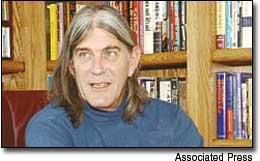A visit to Anahola by controversial University of Colorado professor Ward Churchill preceded by almost 12 years his speech made last night at the University of Hawai‘i at Manoa. Churchill served as a juror for a statewide series of meetings
A visit to Anahola by controversial University of Colorado professor Ward Churchill preceded by almost 12 years his speech made last night at the University of Hawai‘i at Manoa.
Churchill served as a juror for a statewide series of meetings held in 1993 across the state.
“Ka Ho‘okolokolonui Kanaka Maoli: The Peoples’ International Tribunal” was led by Dr. Kekuni Blaisdell, then a professor of medicine at the University of Hawai‘i, and was held across the state in August, 1993. He brought in an international organization to judge and organize and help stage the meetings, which coincided with the 100th anniversary of the end of the Hawaiian Kingdom in 1893, an event Native Hawaiian activists call an “overthrow” by United States interests in Hawai‘i.
Furious lawmakers in Colorado have threatened to take state funding away from the university in Boulder over an essay by Churchill, who is a tenured professor of ethnic studies, who wrote that some “technocrats” killed in the World Trade Center were like Adolf Eichmann, who orchestrated the Nazi holocaust.
His appearance in Honolulu has raised the issue of state tax dollars paying for speakers who make unpopular statements, with University of Hawai‘i officials citing freedom of speech in refusing to cancel his appearance.
State Sen. Fred Hemmings, R-Kailua-Hawai‘i Kai, criticized the university’s choice of speakers. He said in a press release, “The university must not confuse supporting first-amendment rights with supporting literary, professional and cultural deceit.”
Hemmings cited reports he claimed show Churchill is not a Native American, as he claims, and that the Colorado professor is guilty of literary fraud.
“Any university that prohibits free speech and the diversity of ideas is engaged in indoctrination, not education,” said Ed Coll, who is an instructor at Kaua‘i Community College, which is a local branch of the University of Hawai‘i.
Coll and Carol Bain are partners in Kauai World-wide Communications, which they run out of their home in Puhi. They produced “Hawaii Under Siege,” a 30-minute documentary video of the conference in Anahola in 1993.
Bain said they have requested it be rebroadcast in the near future on the Ho‘ike Kauai Community Televi sion, Inc. public-access cable station.
She said some of the Native Hawaiians involved in the meeting have since passed away, including Hilbert C.K. “Kahale” Smith, who barricaded himself in his home, set the house on fire and died in the flames in January 1996 during an eviction action by state Department of Hawaiian Home Lands authorities, and Butch Kekahu, who led the Hawaiian rights “Aloha March” in Washington D.C. in August 1998.
The meeting in Anahola came the same year as an apology by President Bill Clinton for the what Clinton called the “overthrow of the Kingdom of Hawai‘i by the United States.” A report from the Anahola meeting said an empty chair was left to represent the lack of a representatives from state or federal governments.
Michael and Sondra Field Grace of Anahola hosted the tribunal meeting at a temporary home they called Ili Noho Kai o Anahola, and constructed near the Anahola Beach Park in the aftermath of Hurricane ‘Iniki, which struck in September 1992.
“For the first time, the United States was brought before a court of international civil society to account for the invasion, annexation, and forced integration of Hawaiian territory, and for crimes committed against the Kanaka Maoli (indigenous Hawaiian) people and nation,” Blaisdell wrote in an account of the event.
Appointed as prosecutors in the tribunal were attorneys Glenn Morris, professor of political science and director of the Fourth World Center for the Study of Indigenous Law and Politics at the University of Colorado at Denver, a department that Churchill is an associate with; José Morín, executive director of the North Star Foundation; and Maivan Clech Lam, professor of law at the City University of New York.
Churchill was among the judges appointed for the tribunal. Others included Richard Falk, Albert G. Milbank Professor of International Studies at Princeton University; Lennox S. Hinds, professor of law at Rutgers University, and counsel to the African National Congress (ANC) in the United States; Milner S. Ball, Caldwell Professor of Constitutional Law at the University of Georgia; Hyun-Kyung Chung, professor of theology at the Ewha Women’s College in Seoul, Korea; Te Moana Nui a Kiwa Jackson, director of Maori Legal Services in Wellington, New Zealand; Asma Khader, a journalist and member of the Palestinian Rights Society and the National Committee for the Protection of Children; Oda Makoto, a Japanese novelist and visiting professor of comparative studies at the State University of New York at Stony Brook; and Sharon Venne, a human-rights advocate at the United Nations, and Rockefeller Fellow at the University of Colorado.
The tribunal met on Maui, Moloka‘i, O‘ahu, the Big Island and Kaua‘i. Grievances were made against officials of corporations, resorts, the United States military, and other government agencies.
Among charges raised were genocide against the Hawaiian people, imperialism, and other accusations.
Similar charges have been brought before the World Court in the Hague.
Chris Cook, editor, may be reached at 245-3681 (ext. 227) or ccook@pulitzer.net.


